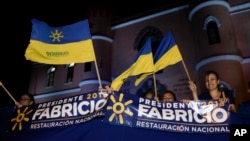An international court ruling saying Costa Rica should allow same-sex marriage has upended the Central American nation’s presidential race, turning an evangelical candidate who opposes it from an also-ran with just 2 percent support into the leading contender in Sunday’s vote.
Following last month’s decision by the Inter-American Court of Human Rights, Fabricio Alvarado, a 43-year-old journalist with a prominent career as a preacher and Christian singer, vaulted to 16.9 percent in a survey published Jan. 31 by the University of Costa Rica’s Center for Research in Political Sciences (CIEP).
Alvarado’s nearest rivals were Antonio Alvarez of the National Liberation Party with 12.4 percent, and Carlos Alvarado — no relation — of the governing Citizens’ Action Party with 10.6 percent. If no candidate tops 40 percent in the vote, the first two finishers advance to a runoff scheduled for April 1.
Roman Catholic nation
The same poll showed that just more than two-thirds of Costa Ricans oppose the court’s ruling, which also tells the country to grant same-sex couples rights such as the ability to adopt children and receive inheritances and other benefits from their partners.
For deeply Roman Catholic Costa Rica, the gay marriage ruling came as an “external shock” to the campaign, political analyst Francisco Barahona told The Associated Press.
“Fabricio is a young candidate, well-spoken with a good on-camera presence, but he was also the only one who reacted in radical opposition to what the Inter-American Court proposed,” Barahona said. That “put him on the radar for a good portion of the conservative electorate.”
Alvarado has called the ruling a “sovereign violation” and an “external imposition” and even floated the idea of withdrawing from the OAS-sponsored rights court, which is hosted in Costa Rica’s own capital, San Jose.
That won tacit approval from evangelical and Catholic leaders who, while prohibited from explicitly participating in elections in the country, have called on voters to back candidates with “Christian values.”
About 76 percent of Costa Ricans identify as Roman Catholic and 14 percent as evangelical, according to the CIA World Factbook.
Values, not party
Adrian Pignataro, a political scientist at the University of Costa Rica, said the country has seen a marked erosion in party loyalty and this election has exposed a social divide between secular and religious values.
“It’s not that this division is new, they are values that were there before, but in this campaign they were activated by an event and one party strategically came out in favor,” Pignataro said.
Carlos Alvarado, who is not related to Fabricio, is also a young candidate at just 38, a journalist by profession who began his political career as communications director for the Citizens’ Action Party and served as labor minister under current President Luis Guillermo Solis.
His candidacy has been marred by corruption scandals involving people close to Solis’ government and a lingering deficit problem.
But as the only major candidate openly backing same-sex marriage, Carlos Alvarado also saw his poll numbers rise about 5 percent recently as he attracted socially liberal voters who oppose Fabricio Alvarado’s anti-gay marriage stance.
Sunday’s outcome is very much up in the air with more than two-thirds of likely voters undecided, according to the CIEP poll.




